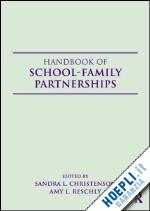PartI: The Backdrop: Theoretical and Empirical Bases of Partnerships. Application of a Developmental/Ecological Model to Family-School Partnerships. Motivation and Commitment to Family-School Partnerships. Elements of Healthy Family-School Relationships. Diversity in Families: Parental Socialization and Children's Development and Learning. Culturally-based Worldviews, Family Processes, and Family-School Interactions. PartII: Partnerships Across Children’s Development/Schooling Levels. The Home Learning Environment and Achievement During Childhood. Parent Involvement in Early Education. Partnering to Foster Achievement in Reading and Mathematics. A School-Family Partnership: Addressing Multiple Risk Factors to Improve School Readiness and Prevent Conduct Problems in Young Children. Stormshak, Dishion,Falkenstein, Family-centered, School-based Mental Health Strategies to Reduce Student Behavioral, Emotional, and Academic Risk. School-Family Partnerships to Promote Social and Emotional Learning. School Connectedness and Adolescent Well-being. Family-School Partnerships and Communication Interventions for Young Children with Disabilities. Creating School-Family Partnerships in Adolescence: Challenges and Opportunities. PartIII: Driving the Research Agenda to Inform Policy and Practice. Debunking the Myth of the Hard-to-reach Parent. Family-centered Helpgiving Practices, Parent-professional Partnerships, and Parent, Family and Child Outcomes. Mapping Family-School Relations in Comprehensive School Reform Models and Charter School Designs: A Call for a New Research Agenda. Future Directions in Family-School Partnerships. Methodological Issues in Family-School Partnership Research. From Periphery to Center: A New Vision and Strategy for Family, School, and Community Partnerships. Moving Forward in School-Family Partnerships in Promoting Student Competence: From Potential to Full Impact.











